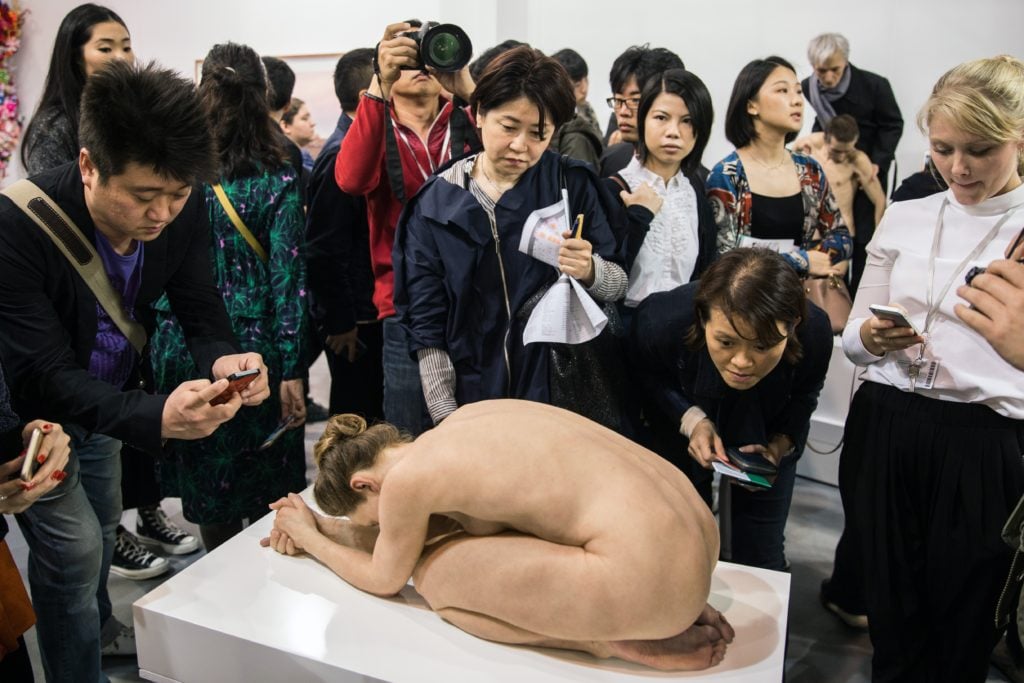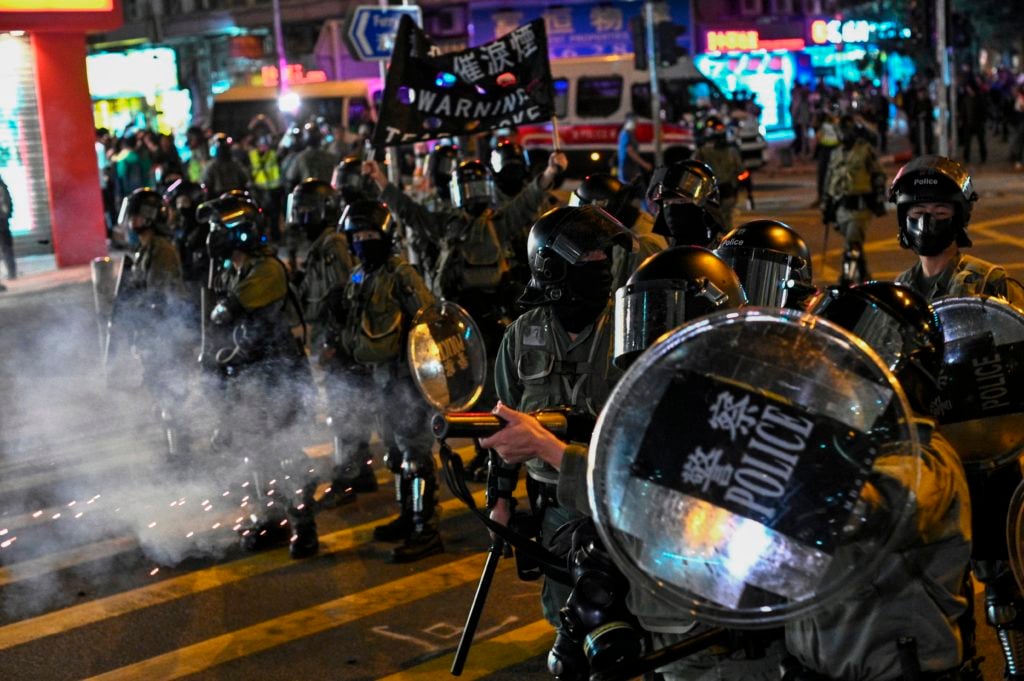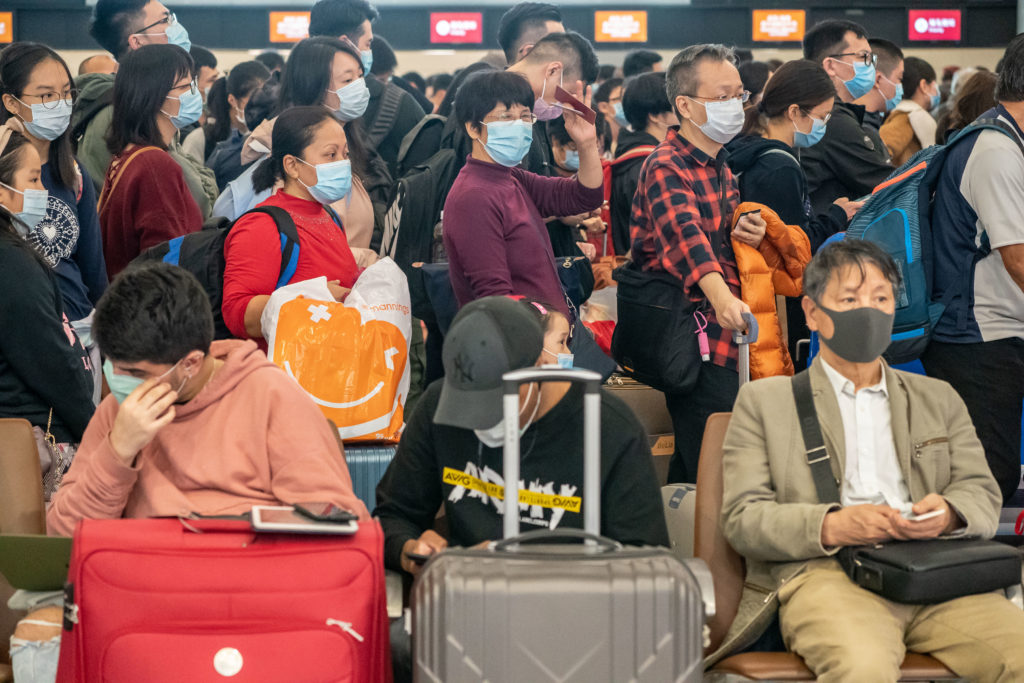Opinion
The Gray Market: Why the Coronavirus Canceled Art Basel Hong Kong When the Protests Couldn’t (and Other Insights)
Our columnist digs through the aftermath of Art Basel Hong Kong to explain why the devil was in the (insurance) details.

Our columnist digs through the aftermath of Art Basel Hong Kong to explain why the devil was in the (insurance) details.

Tim Schneider

Every Monday morning, Artnet News brings you The Gray Market. The column decodes important stories from the previous week—and offers unparalleled insight into the inner workings of the art industry in the process.
This week, dredging the wonkiest depths for something of value…
On Thursday, Art Basel and its parent company, the MCH Group, officially canceled Art Basel Hong Kong’s 2020 edition (previously slated to run March 19–21). A statement by the MCH Group attributed the decision to the “outbreak and spread” of the 2019 novel coronavirus, which Chinese health officials announced on Sunday had infected more than 37,000 people and killed over 810—more fatalities than the SARS virus caused during its entire rampage in 2002 and 2003.
Since so many Western galleries and market-watchers reacted to news of the fair’s cancelation with some version of, “What took them so long?,” I decided to dig into that question. And after coming back to the surface, I feel comfortable saying that the answer is more complex than most of us realized.
Before I go any further, though, let’s establish an important reality about the situation: no one involved is really happy about Art Basel Hong Kong disappearing from this year’s calendar. In the days and weeks leading up to its final decision, Art Basel was trapped in a vise by two constituencies of its exhibitors. As badly as most of the Western galleries wanted the fair “put out of its misery,” as London dealer Richard Nagy memorably wrote in a January 29 letter to Art Basel officials, Hong Kong galleries wanted just as badly for the fair to soldier on. The tension meant that Art Basel knew for months that it would infuriate a significant portion of its clientele no matter what decision it made.
In the end, the cancelation robs every exhibitor of something. All dealers who had not voluntarily pulled out of the fair already will receive 75 percent of their respective booth fees back, meaning a quarter of their investment is gone forever. Even if they were given a full refund, galleries would still be forfeiting the sales they were counting on when they applied to Art Basel Hong Kong months ago, to say nothing of any real costs they incurred on planning their stands, fabricating artwork, and making other preparations.
What about Art Basel, though? Did the coronavirus merely provide a politically agnostic opportunity to call off an event that many Western exhibitors alleged had already lost viability after the ongoing pro-democracy protests convinced a significant number of their buyers and artists to opt out months earlier? And if so, did the organization take until February 6 to decide strictly because its international galleries were facing shipping deadlines? Or was something else entirely at work?
To decipher the answers, it turns out that we may have to look in what many, if not most, people view as the single unsexiest realm of arcana in the entire art market: insurance policies. But that sojourn strongly hints that the outcome, as well as the timing, of Art Basel Hong Kong’s cancelation resulted more from objective financial and legal mechanisms than subjective moral or political calculus.

Visitors crowd around Australian artist Sam Jinks’s Untitled (Kneeling Woman) at Art Basel Hong Kong 2015. AFP PHOTO / ANTHONY WALLACE
Now, I’m going to preface everything that follows with this disclaimer: I have not seen either Art Basel’s insurance policies or its contract with exhibitors for the Hong Kong fair. An MCH Group spokesperson declined my request for details, and my budget Woodward-and-Bernstein efforts yielded nothing definitive. This means I’m left to speculate about a host of important elements in this equation.
That said, I also spent a lot of time over the weekend trying to make sure it’s the most responsible speculation possible, including long conversations with multiple highly placed professionals in the fine-art insurance and legal sectors. Here’s my best read of the what, why, and when of Art Basel Hong Kong’s demise based on that reporting and research.
First, an Art Basel spokesperson confirmed that the company filed an insurance claim for the Hong Kong fair. So we know that the company had a policy on the event, and based on the scale of Art Basel Hong Kong, we can reasonably conclude that the value of that policy is substantial.
But what kind of insurance was it? The likeliest answer is what’s known as event-cancelation insurance, which covers the policyholder in cases where an event must—emphasis on “must”—be kiboshed due to forces outside the organizer’s control.
Although an international art fair is a niche event, event-cancelation insurance is actually not a niche product. People can (and do) take out these policies on everything from museum galas to weddings. If there’s a lot of money riding on the event, and all hell breaks loose if it doesn’t happen on the scheduled day, you can almost assuredly get this coverage.
But every insurance policy has what are known as exclusions: explicitly defined events or circumstances that are expressly not covered. Exclusions are a pivotal factor in determining how and when an insurer actually pays out on a particular claim. And it is very likely that Art Basel’s event-cancelation policy for Hong Kong excluded the complications and dangers caused by the protests so far—but not the complications and dangers caused by the coronavirus.
The main reason is that the insurance industry offers separate policies for events such as terrorism, political violence, and political risk (which can include political violence, but also expands to protect against problems such as government seizure of property or collapse of the local financial system). In general, event-cancelation insurance tends not to guard you against these threats. So if you as an event organizer don’t have distinct coverage tailored to these distinct categories of bad news, you are likely left on your own to face the losses they cause. Good night, and good luck.

Police fire tear gas during a protest at Hung Hom area in Hong Kong on December 1, 2019. Photo by Philip FONG/AFP/Getty Images.
Now, do I know that Art Basel didn’t have a separate policy that would have shielded the organization financially if the Hong Kong protests forced the fair to shutter? No, nor do I know with 100 percent confidence that its event-cancelation policy might not have done the same. In fact, I suspect one or the other of these possibilities was in place.
Why? Because Art Basel publicly committed to refunding 75 percent of exhibitors’ booth fees if it were forced to cancel this year’s Hong Kong fair on account of civil unrest back in mid-January, before the coronavirus replaced the protests as the primary risk to the event. That’s too rich a commitment to make out of goodwill and a sense of fairness.
But even if Art Basel had coverage that could be triggered by the demonstrations, what were the triggers? The key is that the way an insurance policy is written matters just as much as having the policy at all. After all, insurance policies are contracts—and in contracts, language is everything.
Consider this example: Hypothetically, I could buy specialty insurance that would pay me some amount of cash in the event that I lose my ability to write. But the policy has to explicitly, objectively define what it means for me to “lose my ability to write.” Even if both of my hands devolved into arthritic Tyrannosaurus Rex claws incapable of navigating a keyboard, my affliction may not be enough to satisfy the terms of the policy. Couldn’t I use a voice-to-text app instead, the insurance adjuster would ask? If so, my claim might be denied, and my gnarled dinosaur digits wouldn’t win me a nickel of compensation.
In other words, an insurance policyholder’s general situation can suck… but if it doesn’t suck in the exact way(s) defined in the policy, the insurer pays them nothing.
All of the above means that Art Basel would have needed specific events to trigger coverage under any possible insurance against the protests. So it’s entirely possible that the demonstrations could continue to rage, continue to intensify—even dramatically so, in subjective terms—but still fail to meet the precise criteria that define when the fair can no longer proceed. Whether or not the company suffered catastrophic financial losses would all depend on the contract terms.
The same general framework would apply to insurance coverage against the outbreak of a deadly disease like the coronavirus. The difference is that the necessary trigger(s) for coverage have been hit, and the timeline enables semi-responsible guesses about what those triggers might have been.

Travelers wearing face mask wait at the departure hall of West Kowloon Station on January 23, 2020 in Hong Kong. (Photo by Anthony Kwan/Getty Images)
One piece of recent coronavirus news seems especially relevant to me in this context. On January 30, the World Health Organization declared the disease a “public health emergency of international concern” (PHEIC). This is an official designation that empowers the WHO to assemble a special committee of researchers and public-health officials to make specific recommendations to specific nations about how to contain and combat the illness in question. Eight days later, Art Basel and the MCH Group announced the cancelation of Art Basel Hong Kong.
If the gap between those two events makes you suspicious of any causal link, bear in mind that any time a policyholder makes an insurance claim, the insurer will take time to make what’s referred to as a “determination of coverage.” Remember, insurance is basically institutionalized gambling: the policyholder places a bet (the insurance premium) that some awful thing will happen, and the insurer places a bet (the face value of the policy) that it won’t. If the awful thing never happens over the course of the policy, the policyholder loses the bet. But if the awful thing does happen, the insurer loses the bet and pays out a much higher amount. Before an insurer writes that fat check, though, it will take time to verify that it absolutely has to under the terms of the bet (the insurance policy).
How sure am I that the WHO’s designation of the coronavirus as a public health emergency triggered coverage under Art Basel’s insurance policy? Not very, actually.
The vast majority of the WHO’s advice applied to mainland China. Obviously, there’s a tight art-market relationship between the People’s Republic and Hong Kong, but the WHO’s recommendations never mention Hong Kong by name. The committee also “[did] not recommend any travel or trade restrictions” based on the information available at the time, and as of Sunday, had not upgraded the coronavirus to the status of “pandemic”—a medical term invoked when a disease infects more than one region on a mass scale. And justifiably so, since only a few dozen cases have been verified in any other individual country besides China.
But there’s another angle to consider here. According to the National Law Review, the coronavirus delivers a rare one-two punch in the insurance arena because it “includes both a naturally occurring component (the virus itself) and a government-action component (including the quarantines and other measures put in place in response to the outbreak).” In the context of an event-cancelation policy, then, the disease is outside the organizer’s control, but so too is any lockdown meant to minimize its damage. So even if the WHO’s ruling didn’t trigger Art Basel’s insurance coverage, voluntary state actions might have.

Visitors viewing artwork at Art Basel Hong Kong on March 27, 2019. (Photo by Theodore Kaye/Getty Images)
The government action in question might not just refer to China or Hong Kong, either. As of Saturday, 62 countries had implemented some form of restrictions on recent travelers to mainland China, ranging from health checks upon arrival to outright refusals of entry. Hong Kong is now among them; two days after Art Basel Hong Kong’s cancelation, the city imposed a mandatory two-week quarantine, punishable by fines and/or prison time, on incoming passengers from anywhere in China.
Although the National Law Review focused on state action in its description of the coronavirus’s potential insurance impacts, commercial entities’ decisions could be a factor, too. All those grounded flights to Hong Kong loom large in my mind, especially if they extend from passenger flights to air freight. Even if some of the sellers and buyers could somehow have made it to an art fair, it wouldn’t do a lot of good if much of the art couldn’t. Case in point: back on the mainland, many workers still aren’t sure when they’ll be allowed to return to their jobs, and the uncertainty could wreak havoc on international commerce of all kinds.
So while I can’t tell you what specific coronavirus-related event(s) triggered Art Basel’s insurance policy in Hong Kong, I feel reasonably confident saying the following: those event(s) were specifically defined, objectively verifiable items written into the contract; they only happened in the 10 days or so immediately preceding the cancelation announcement; they were just as likely to involve state or commercial responses to the outbreak as to the disease itself; and perversely, the financially beleaguered Art Basel was probably saved by the virus—because as troubling and dangerous as the protests have been, they do not appear to have triggered events that would necessitate an underwriter paying the organization a cent.
All told, then, this game-theory exercise illustrates just how complex, high-stakes, and globally interwoven the art trade has become in 2020, at least at the upper reaches. And while that generality may not be news at this point, it reinforces that the decision to call off the fair always hinged primarily on economics, not ethics.
That’s all for this week. ‘Til next time, remember: if you’re complaining about losing art deals, be thankful you’re not among the thousands at risk of losing their lives or loved ones instead.